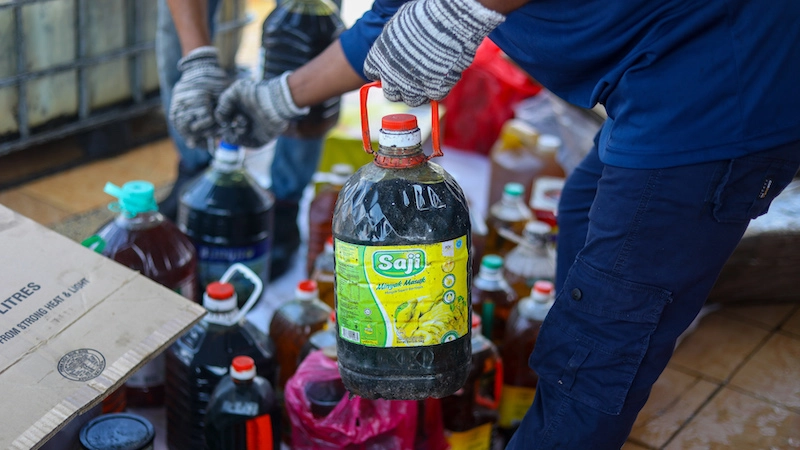The aviation industry should stop branding all alternatives to traditional kerosene as “sustainable” or risk facing lawsuits, a climate nonprofit has warned, as concern grows about fraud in the production of sustainable aviation fuel (SAF).
Consumer protection laws and anti-greenwashing regulations across Europe could expose the industry to legal challenges if it misleads the public with sweeping assertions about the environmental benefits of different fuels with varying sustainability profiles, according to a report by UK-based NGO Opportunity Green.
When advertising the fuels, airlines should instead use the term “alternative fuel” and provide accurate information on varying production processes and environmental impacts, including which raw materials are used, the report added.
Aviation’s Green Dream: Read our investigative series on Sustainable Aviation Fuel
“Precise terminology is critical: mislabelling fuels as ‘SAF’ without robust evidence risks misleading consumers and investors, breaching legal obligations and inviting legal challenge for greenwashing,” said Olivia Moyle, Opportunity Green’s legal officer and author of the report.
Fraud in opaque SAF supply chain
SAF is the aviation industry’s preferred option for cutting the sector’s growing greenhouse gas emissions as the fuels produce less CO2 than kerosene over their lifecycle and do not require alterations to aircraft.
But planes are currently powered by tiny amounts of SAF, which accounted for just 0.3% of global jet fuel production in 2024, according to the International Air Transport Association.
SAF encompasses a wide range of different products, including biofuels made from crops like palm and soy or waste such as used cooking oil (UCO) and synthetic kerosene produced using renewable energy and CO2. Depending on the raw materials and technology used, these fuels can cut emissions by between 50% and nearly 100%.

UCO is currently the most common feedstock for SAF, especially in Europe, where policies forbid the use of crops or virgin oils that could compete for land with food production or carry a high risk for deforestation.
But a Climate Home News investigation this year unveiled a series of integrity risks in the production of SAF made from UCO, which is being ramped up due to new blending quotas in the EU and the UK. In an opaque supply chain stretching across continents, virgin and barely used palm oil is being passed off as UCO in Southeast Asia, raising doubts over the fuel’s climate benefits, the investigation showed.
Rising tide of legal cases
The NGO report suggests airlines could face mounting legal challenges from using the term SAF wholesale to tout the green credentials of their flights. It points to a growing number of cases in the EU and the UK, where airlines’ environmental claims – largely based on the use of SAF – were found to have breached anti-greenwashing regulations and advertising standards.
Last year, a Dutch court found airline KLM misled customers by saying that flying can be or is becoming more sustainable, setting a landmark precedent for anti-greenwashing litigation. The ruling said the term “sustainable” to describe alternative aviation fuels was not concrete enough to be promoted as a promising solution to decarbonising the industry, citing the “marginal” and “uncertain” impact of SAF use on emission reductions.
“A tiny proportion of jet fuel is being marketed as a climate solution for aviation, while the real issues – fossil fuel dependence, rising emissions, and unchecked growth in frequent flying – go unaddressed,” said Johnny White, a lawyer at environmental law charity ClientEarth which supported the Dutch case but was not involved in the Opportunity Green report.
“KLM has since altered its marketing. But so far, other airlines have yet to fall in line with the law. This kind of greenwashing delays climate action,” White told Climate Home. “By selling the illusion of a green solution to flying, the industry holds back real alternatives such as high-speed rail.”
Explainer: What you need to know about SAF
In the UK, the Advertising Standards Authority has found breaches of its advertising rules in eight cases involving airlines’ environmental claims. Last year, the agency banned a radio advert promoting Virgin Atlantic’s first transatlantic flight to be 100%-powered by SAF on the grounds that the ad gave the misleading impression that the flight had no negative environmental impacts at all.
“The legal and financial risks that are posed by the growing anti-greenwashing regulation and decisions will send clear signals to the boardrooms of companies that misleading language costs them,” Opportunity Green’s Moyle said.
Risks of CO2 offsetting
A growing number of airlines also offer customers the option to pay a voluntary SAF charge on top of the ticket fare to help offset the carbon footprint of their journey and cover the cost of the more expensive alternatives to kerosene. British Airways, for example, encourages members of its loyalty programme to make voluntary contributions, enabling them to earn and pay with points.
But Opportunity Green said this practice amounts to greenwashing because SAF alone cannot compensate for the negative impacts of flying. That is because the climate benefits attributed to offsetting activities, such as buying a batch of SAF, are significantly less certain than the climate harm caused by flying.
A German court found last March that Lufthansa misled consumers by saying they could offset their emissions by paying for SAF, giving the incorrect impression that the purchased batch of fuel would be used in that specific flight. The complexity of the supply chain means that airlines instead buy a certain quantity of SAF, which is then mixed into the jet fuel supply at a particular airport where they operate.
ClientEarth’s White said more legal challenges are “all but inevitable” as European agencies increase scrutiny of airlines’ green claims. “Where regulators go, litigation tends to follow,” he added.

